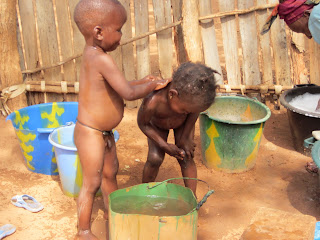We are slowly meeting with NGOS and figure out what capacity we will be working with them in the future. As of now, we will be helping out with the NGO KOMFARI by assisting in a large tree nursery, tree planting in our village, and going on a trek to the 27 villages in KOMFARI’s region to facilitate tree planting. And it looks like Ben will be helping out with KOMFARI as a financial manager, and I will be also be working on helping to establish a website for them. We were also visited by another NGO called IRD (International Rural Development) that works with small farmers to improve their cashew crop. Ben is interested in working with this NGO as they are trying to educate the farmers on the business aspect of cashew growing rather than strictly the technical aspects. I am also hoping to visit another NGO that a Peace Corps volunteer works with that teaches and promotes oyster harvesting. Our village is right on the river and women from other villages come to harvest oysters here; however, the women of our village do not harvest oysters at this time. This is a huge untapped resource for our village, and by teaching these women how to harvest oysters properly will allow them to earn a nice income. Teaching them an environmentally friendly way of harvesting oysters also protects the mangroves in the area as well.
Ben is still planning on working with the eco-lodge to enhance marketing and budgeting as one of his main projects. And I would like to also work with the school in some capacity. In Africa, illiteracy is a big problem and we are seeing that in our village. Our host brother is in 5th grade and is probably at a 1st grade reading level. Although he can’t be blamed, the only book he has been given is about a Jewish holiday with words like ‘shabbat’ and other extremely useful things he’s never encountered.
I read once that the literate farmers’ land is up to 10-15 times more productive than his illiterate counterpart, and from what we’ve seen here, that is true. So, I’d like to help kids read because they need help with it, they could use it when they grow up even if they never leave our village, and well, I can read. Maybe I’ll even set up the ‘Kaddy Gitteh center for kids who can’t read good’.
At this point, a month into our service, it looks like we will have a nice mixture of challenging and interesting work, good company, and lots of stories to bring home.
Our friend Fatou and her two kids








